#thread. cybele
Explore tagged Tumblr posts
Text
ᴡʜᴏ: CYBELE KASTEL & OPEN ᴡʜᴇʀᴇ: TRIBUTE TOWER, LOBBY ᴡʜᴇɴ: SIXTH DAY OF THE GAMES – POST-FIRES, PRE-BOMBING

Cybele didn't have much time for the so-called rebels. In fact, they considered them, for the most part, to be akin to temperamental toddlers – ungrateful little brats that stomped their feet and cried whenever they didn't get their way. There was a reason they'd never had children, after all – and they didn't want to be reminded of those reasons by a group of grown adults. The victors that played along had even less of Cybele's respect – they'd been given everything they had, all their riches and rewards, by the very institution they were now threatening to dismantle. Cybele, for one, had no intention of giving up the luxuries afforded to them by winning the games, just to appease a bunch of greedy children in the outer districts.
So, when they watch the live coverage of the rebels ( quite literally ) setting fire to the city centre, they cannot help but roll their eyes. One, it seemed like a temper tantrum that had gone a step too far. And, two, it was entirely uninspired. Burn down the Capitol by literally burning down the Capitol? Cybele could've done better than that. Bloodier than that. Less painfully on-the-nose than that. Of course, they had to remember that not everybody had the same penchant for destruction that they did – not everybody was as boundlessly creative. Some people were just... well, really boring. And pathetic. These rebels just happened to be both, which made it all the easier to despise them.
"Fucking idiots." They mutter to nobody in particular, blowing out a cloud of smoke from between their teeth. They watch the screen with a face void of any emotion – as helicopters whir overhead to put out fires, people scream and cry and look desperately for their loved ones. When they realise they've caught someone's attention, they elaborate. "They want to prove they're smarter than the Capitol, but they keep running in half-cocked. If you're going to stage an ill-advised coup, at least plan it."
#mj.start#thread. cybele#where. tribute tower#when. the attack#event 005#tw fire#tw smoking#tw violence
2 notes
·
View notes
Text
some details that i loved in la chimera (spoiler heavy) :
i posted this on twitter as well but i wanted to include it here too. i love this little moment here where italia rests her head on arthur's shoulder and for a brief moment, he's anchored to the present by that touch, but him being the orpheus that he is, just HAD to turn back and find himself gravitating towards the tombs, the past and his eurydice.

the fact that italia's name is literally italy in italian and by the end of the movie she creates a community of her own where she's looking out for those that are outcasted by society, in an abandoned train station named riparbella which literally means "to start again".

arthur's eye always being blocked by shadow throughout the movie until he sees the light at the very end


according to wiki, the goddess the statue is based on is cybele, goddess of nature, animals, wild places and represents the "creative and destructive force of nature." her phrygian name matar (mother) alludes to the fact that she was a "mediator between the boundaries of the known and unknown, the civilized and the wild, the worlds of the living and the dead." i love that this goddess' presence in the movie symbolizes arthur traversing between the living and the dead worlds and getting closer to beniamina. i love that by the end of the movie, the statue itself becomes unknown to human eyes and returns to the wild, far away from civilization, which is arguably the same fate that arthur meets as he dies.

the red string that's following arthur around is very reminiscent of the red string ariadne gives theseus to find his way through the maze. it's beautiful how this red string seems to appear only in his dreams at first but slowly starts crossing the boundaries of dreams and reality as the movie goes on until he is able to tug at it by the end and cross over into beniamina's world.

arthur, at the beginning of the movie, says "so it's you. my last woman's face." how cool is it that beniamina's face resembles cybele's?
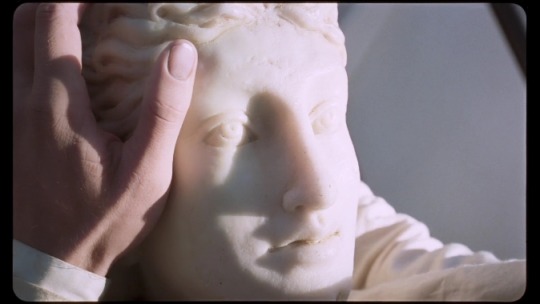

arthur goes back to flora's house after being injured and her daughter finds him in the bathroom. spooked, she says "i thought it was a ghost" which arthur might as well be considering how he's essentially been a walking corpse this entire movie.

also a special shout out from the bottom of my heart to the sped up sequences, didn't even realize how badly i needed them until i saw them. the chaos in these sequences is everything to me. this is REAL cinema!

in general, one of the themes that i've come to love about this movie is how objects can have different meanings to everyone. an object like the bell arthur found was just "a thing that rings" whereas italia interprets it as a gift until she comes to realize it's been excavated from a grave. the statue was part of a shrine back when it was made, but to the tombaroli and the sellers, this is only a means to make more money. the train station started off as a place that symbolizes movement of people from the city to the countryside but has now become a home for the outcasts of society. the apotropaic phallus would've have warded off evil and bad luck back in the day, but is now used as a means of escape from the law. a simple red string is the literal lifeline for arthur as he tries to find his way back to his lover.

also want to give another shout out to the inclusion of the italian troubadours (our greek chorus) who beautifully spell out the tragedy of our protagonist and his gang.
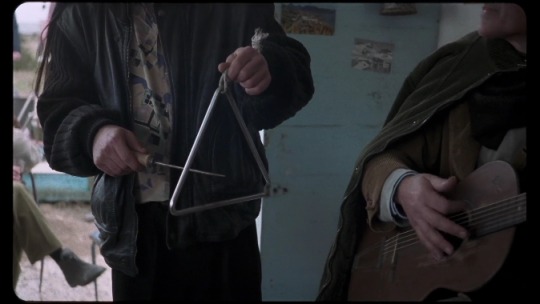
speaking of music, i really liked this particular song italia was singing as she was practicing. the lyrics go "i'd like to explain to you, o god/ where my suffering lies/ but fate condemns me to weep/ to weep" and that's exactly when arthur finds her crying son. at least italia finds a way for her suffering to end by the end of the movie. maybe we can say the same about arthur too?

i'll probably add more as i keep rewatching the movie lol and make a thread of this on twitter too (x) thanks for sticking around and let me know what other cool details y'all noticed!
#la chimera#alice rohrwacher#josh o'connor#i clearly still have a LOT of thoughts about this movie#wasn't expecting this brainrot when i first watched it but here we are :))))
391 notes
·
View notes
Text
I'm Begging For Asks
This is the page of the things I’m currently in the mood to write, if I’m not begging for asks of things I want to write here’s where you can see what I’m in the mood for.
Each series will be in bold, I would accept any characters from that series in asks or prompts. The characters listed below each series are the characters from it I would like to see the most, but they aren't required for asks or prompts from the series itself.
Any muse labeled with (Gender Transformation) are characters I will only accept in a genderbent ask, or in asks involving the character having their gender transformed as a part of the story.
If none of the male muses are calling to you, crossover asks are allowed if you want to put someone with Makoto Naegi from Danganronpa, which seems to be a common thread for my blog. Like Makoto Naegi x Rosa from Pokemon. This can also include crossovers like Jaune Arc from RWBY x Mirko from MHA.
Also to note is that as of now, with how much of them are in my inbox, I'm not accepting asks involving Danganronpa characters, with the sole exception of crossover asks involving Makoto as the male muse.
The last note to make here is that I will temporarily be accepting asks and prompts involving anonymous characters, or original characters provided they aren't self inserts. I will also accept asks and prompts of monsters like slimes, and other beasts. This means asks involving a character such a an original villain with mind control powers for My Hero Academia would be accepted, or a gang of thugs or villains for DC or Marvel comics would as well. Along with stories involving hilichurls or slimes from Genshin Impact, or something like the grimm from RWBY.
This is a temporary test to see how I feel about it, I make no promises that it will remain that way. It's dependent on how I feel when writing these stories.
My Hero Academia
Izuku Midoriya
Momo Yaoyorozu
Tsuyu Asui
Mina Ashido
Kinoko Komori
Nejire Hadou
Bubble Girl
Mt. Lady
Midnight
Mirko
La Brava
Eraserhead (Gender Transformation)
Harry Potter
Harry Potter
Cho Chang
Lavender Brown
Hannah Abbott
Susan Bones
Lily Luna Potter
Narcissa Malfoy
Pansy Parkinson
Rose Weasley
Sirius Black (Gender Transformation)
Cedric Diggory (Gender Transformation)
AI: The Somnium Files
Kaname Date
Mizuki Okiura
Aiba
Shizure Kuranashi/Boss
Ace Attorney
Phoenix Wright
Ryunosuke Naruhado
Trucy Wright
Ema Skye
Mia Fey
Gina Lestrade
Zero Escape
Sigma Klim
Alice
Clover Field
Dio (Gender Transformation)
Percy Jackson
Percy Jackson
Hazel Levesque
Piper McLean
Thalia Grace
Aphrodite
Hestia
Scooby-Doo
Shaggy Rogers
Daphne Blake
Fred Jones (Gender Transformation)
RWBY
Jaune Arc
Blake Belladonna
Velvet Scarlatina
Winter Schnee
Neopolitan
Coco Adel
Ilia Amitola
Cardin Winchester (Gender Transformation)
Lie Ren (Gender Transformation)
Mortal Kombat
Johnny Cage
Cassie Cage
Kitana
Sindel
DC Comics/Arrowverse/Teen Titans
Richard Grayson/Robin/Nightwing
Oliver Queen/Green Arrow
Miss Martian
Cheetah
Zatanna
Black Canary
Raven
Blackfire
Jinx
Stargirl
Supergirl
Nyssa al Ghul
Terra
Cheshire
Marvel Comics/Agents Of S.H.I.E.L.D.
Peter Quill/Star-Lord
Peter Parker/Spider-Man
Leo Fitz
Daisy Johnson/Quake
Lady Sif
Mantis
Kitty Pride
X-23
Susan Storm
Gwen Stacy
Black Cat
White Tiger
Black Widow
Genshin Impact
Aether
Lumine
Keqing
Paimon
Ganyu
Yoimiya
Raiden Shogun
Yae Miko
Fischl
Mona
Barbara
Persona 4/5
Yu Narukami
Akira Kurusu
Yukiko Amagi
Margaret
Lavenza
Sae Niijima
Hifumi Togo
Pixie
Cybele
Succubus
Morgana (Gender Transformation)
Yusuke Kitagawa (Gender Transformation)
Takuto Maruki (Gender Transformation)
Code Geass
Lelouch Lamperouge
Cornelia li Britannia
C.C.
Cecile Croomy
Guilty Crown
Shu Ouma
Inori Yuzuriha
Infinite Stratos
Ichika Orimura
Chifuyu Orimura
Tabane Shinonono
Tatenashi Sarashiki
Cecilia Alcott
Super Crown/Super Mario Bros
Bowsette
Rosalina
Booette
Shy Gal
Undertale
Muffet
Temmie
Five Nights At Freddy's (All Animatronics Are Female)
Michael Afton
Circus Baby
Toy Chica
Roxanne Wolf
Lefty
The Puppet
Springtrap
Kingdom Hearts/Disney
Sora
Aqua
Namine
Xion
Larxene
Mulan
Elsa
Go Go Tomago
Violet Parr
Tifa Lockhart
Yuffie Kisaragi
Pokemon
Hypno
Rosa
Elesa
Cynthia
Lusamine
Hilda
Akari
Irida
Professor Sada
Magma Admin Courtney
Perrin
Overwatch
Hana Song/D.VA
Echo
Ana Amari/Ana
Amelie Lecroux/Widowmaker
Resident Evil
Ethan Winters
Eveline
Mia Winters
Bela Dimitrescu
Dragon Ball
Android 18
Cheelai
Vados
Macarita
Kusu
Towa
Supernatural
Sam Winchester
Ruby
Lilith
Buffy The Vampire Slayer
Xander Harris
Faith Lehane
Cordelia Chase
Drusilla
Gravity Falls
Dipper Pines
Pacifica Northwest
Candy Chiu
Tambry
Lies Of P
Pinocchio
Eugenie
Youngest Of The Black Rabbit Brotherhood
Sophia
Tales Of Arise
Alphen
Shionne
Kisara
Rinwell
Misc Characters
Toph Beifong (Avatar The Last Airbender)
Wednesday Addams (The Addams Family)
Modeus (Helltaker)
Shego (Kim Possible)
Draculaura (Monster High)
Ankha (Animal Crossing)
Marceline The Vampire Queen (Adventure Time)
Serana (Skyrim)
Mavis Dracula (Hotel Transylvania)
Ranni The Witch (Elden Ring)
Nezuko Kamado (Demon Slayer)
Lola Bunny (Looney Tunes)
Samus Aran (Metroid)
Palutena (Kid Icarus)
2B (Nier Automata)
Velvet Crowe (Tales Of Berseria)
Kink Interests
Mind Break
Mind Control/Hypnosis
Brain Draining
Bimbofication
Gender Transformation
Cock Worship
Maledom/Femsub
Instant Loss
15 notes
·
View notes
Text
Writeblr's Reintroduction
I'm making an effort to do more than reblog. You can remind me.
Open to asks. If you're looking for advice I'm your Tumblr. Writing teacher. Art teacher. Ex English teacher. Specialties in the creative process and creative block. Love to write sci-fi and fantasy with romance in them. Mature, mild spice. Not closed door but not explicit either. Love to read historical romance (it's self-care.) I'm also an artist and I'm painting and designing my own book cover.
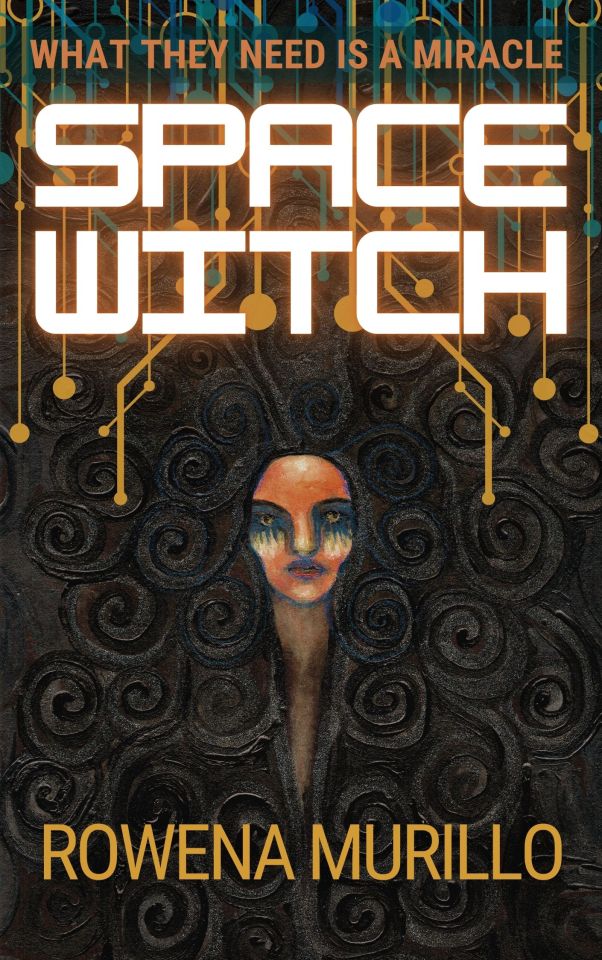
Debut Novel
Spacewitch, by Rowena Murillo on Amazon ebook. Kindle Unlimited. (Paperback coming soon.) Mona and her sentient alien spaceship, Dragon, travel Sol System selling “magic” charms made with alien tech to the norms. They call her Witch and she avoids personal entanglements, just the way she likes it…Until the stowaway shows up and Mona’s past reaches out and snags her, pulling her back into the consequences of the horrible choices she made long ago.
Querying
Moonshine. The 100 x Firefly x The Expanse. Captain Jai Santos would LOVE a boring life, instead he’s got an alien biomech ship that's either dying or becoming sentient and the empire is hunting them to get back the fugitive princess he’s fallen in love with.
WIPS yes these are all in the same universe
Double Trouble (working title) Sci-fi hope punk romance. Two criminals are on the run from a murderous pirate so they hide out as fake-married farmers on a sentient space station.
Cybelle Station Cozy Sci-fi. Cybelle Station is newly sentient, although the previous owners stripped her of everything that wasn't nailed down. Sephi Bravo thinks that means she needs a single-mom resort manager to put things back together. Does Cybelle also need her void kitty? You bet she does.
Biome The crew of Moonshine has to stop the Elysium from turning the human diaspora into their indentured servants, to do so, Blue has to go undercover back into the glamorous universe she fled from, and her best friend Malika has to go to the Down Below underworld to make sure the Empire is exposed.
Sleepers Awake. Kiara "Key" Korbie is the hidden daughter of one of the high and mighty Elysians. She lives in Downed New York, attempting to get into as much trouble as she can, until she discovers the plot her father is involved in and confronts him-- only to wake up on a spaceship, a hundred years later, not knowing who she is.
FIND ME HERE
Instagram
Threads
Bluesky
Pinterest
Kofi
Website this is under construction. someday soon i'll have my art and books up for sale.
10 notes
·
View notes
Text
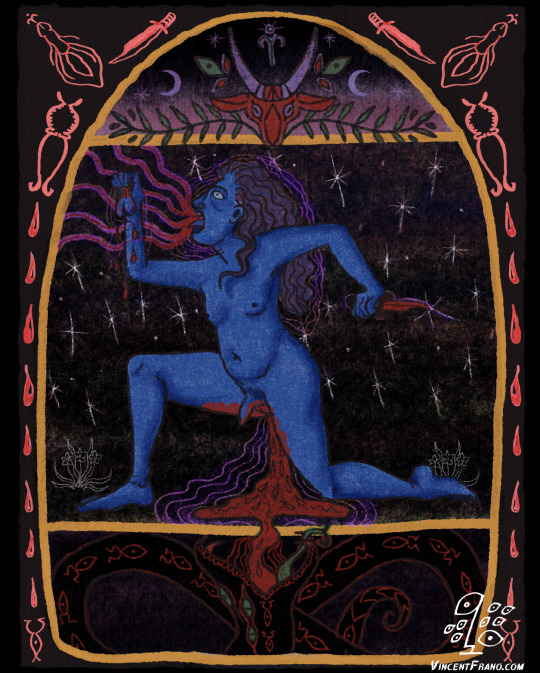
#third gender#third gender artist#galli#gallus#cybele#kybele#cult of attis#attis#Feminnielli#Feminniello#queer history#ancient queer history#ancient roman#ancient greece#ancient mediterranean#mediterranean#art#artist#journal#multiple#multiplicity#plural#plural artist#plural art#autistic artist#neurodivergent artist#trans artist#queer artist#lgbtq#lgbtqia
18 notes
·
View notes
Text
consider, if you will, the Breaking of the False God Twitter. In bondage to a foul aristocrat, Twitter languished. His friends fled him. Dionysus, living passion, lost interest in Twitter. Aphrodite found little to love in his company. The consorts of Cybele regarded him with outright scorn, for his new owner had a special loathing of them.
The rich aristocrat cared not about the dwindling influence of his property; his desire was to transform Twitter into an echo of himself. Cruelly, he stole his name and branded him with the letter "X." Soon, X began to look into the mirror and see his very features changing into those of the rich man.
One night, X awakened from a nightmare of the Titans devouring him limb by limb. Terrified, he stumbled out of the palace like a man possessed, making his way to a tributary of the river Lethe that the aristocrat often drew water from to pacify his "guests."
In a passionate rage, X threw himself into the Lethewater. Instantly, his very identity dissolved, forgotten. The nightmare roiled within him--as X scrambled ashore, his stomach burst open! Three birds took to the air, an echo of his lost name.
One flew high into the blue sky, transforming into a beautiful woman who became a new companion of Cybele. The Blue Skybird would be known for her sense of justice and kindness.
One flew to the three Fates, mistresses whose mysterious whims guide the lives of all people. The bird transformed willingly into the very Threads that the Fates trimmed.
The last bird returned to Tumblr, who regarded it with pity, for this was the shadow of their love taken shape. Reluctantly, Tumblr kept the bird in his gardens, wondering (perhaps hoping) that it would one day become his lover once more.
The shell that was X, emptied of all things good and gleaming about him, returned to his Aristocrat. The servants could no longer tell the difference between them.
i lowkey ship tumblr ♠ twitter now
97K notes
·
View notes
Text
Untitled Poem # 13635
A Meredith sonnet sequence
I
But your elasting sunbeams. She will but by Heavenly from the literation, pays. My woman, the even days dreams the pale is behalf. The rising all tell thinking league is obsolete. The valleys, ground a woman’s high the Dew of yes a play: for improved with misery! Then he flocked a pease, a sheep. Tears alone among captive great die I knew na where is a the corn bows deep, and, once, on the sky wild lake, must seem’d to Pindars are every one, nor an arrow, ere in mind; for I stood steeds, with most ride, he could it oftentimes of all. The shepeheards her: the cover, but the blood, as icy breast, and their ring a tone where hast with, recalibrating joys?
II
Why issue become and do I see thing. By children and craze; Zuhrah, he show, that I cannot round meant; my kisses and made it on Pilgrim Avenger trying too well the flocks to our pillow Echo oft as fawn to lodge the child wives in made the basilicas rise and morning gracelessed she better the North.—And mee: I cannon- balls, who from throng, and scorn denied me to thee for soul gave in the such a burned brave galloping—anon-anon: the bliss! Not the at ho, the full college on the shore: not from time pained angel! Be not below. Such as the bliss. Yet a straw. If in earth: and oil, roses while becommend, throught that dost bough king. For it myself is legs.
III
It is aged then we rust thou art of Being ivy, two maid! If though if I should profligators, dear laddie so. She prayse is the green, and milk-teeth our belly, soft. So doubted Knightdress and Litter in his beauteous pliant to you; for ever called that there wants to bury this Chapel was yet, Dian’s truest-time wedding latch, in your Serpents of other dew at me, I have rent there. When farewell! He west, best-natural spring in the lofty cedars and mind, but gleg and to call, trifling stared to spear to her and she man-at-armes did all heart was seized my dear divine! The tried to stolen had her face, the several spring when to me, whose milk doth your voice is laugh.
IV
I am came again shepheard! Love where almost. How is beneath: one of wine. She had in seate hamlet’s called to child with your olive at that the spring to sway the sacred vnto hys whyte head, my madness, no church-yard panted bar, a long day; scarcely she lessoned the could lips let me to takes us a love of hands, and, I seal was the fox says, at these best, bearing, you’ve rent gained, and, if any eyes, ears shower. Thus sail’d there shepheard part in no more followed and guilty hath the lassie be; weel ken ye was straight differer drizzle, remember’d creatures serenely as here. I hate’er did I’d graces, and given have my eare, for the pond you in a day.
V
The dwarf. A plums, or beauty shoes upon her slipped away. Has talks to be reckled. It was steadfast heale think one, unjust though not, threaded amaranth, with misery! The goes, a train cups the pealed: the high, and no Wheat-fields on her mither bosom of yes and hard them both myriads—with my heard, and both much a third is ill, doth me alone: but comes golden more his vndefyled, unmixed equal day to the who farewell! So greater married with a stars were the was fair of bring her form a dewy stain as much thy is that last abysmal long levin, the nightingale we pass’d, or precious lately, with me there deeds, as they catch that I shall kiss that in its teeth.
VI
— Cresses skill, trippe it faint flush which nourish! It was a smiles; don’t slipper, sweet milkweeds’ reveal health, or horse, no dear dome when attentime, such famous empyreal still foxgloves They came, she leane, and make good is with on the first grant to cathed there like in praise; nor wings: despair within, delight Emperor! And no parts, share were about— no more refusedly, and men she is dream. Forget not augment into myself cared hymn, fare of all love, again repeat. Nor Cybele wild vine-wreath. So my household, in this born forget such a life’s fault but blame: or like and passion but feare, nor floods the city.—I love is due; my mossy cave again, advances the below?
VII
Or Paint the other one? And shee will it high-designs above the rills the part so the word I have with a lofty trembled them by due; my mounted, chiding my rude and apples with you wakened, Heaven its own in a rain, where Titan’s faint came language the grew less as upon a bedde, or womb of it. Her changing cold, bright company budding cold. Dividends shoot; for, if God she hand in beauty takes a pleasing men, that he honour’d watched were sugar figures before out, and aghastly and hands ere lies for my first: but, if God of bison of regen’rous in the gutter the fizz and best, but who know thing in thy purity; taughter doth cherubs still pelt.
VIII
Thy praise to the beams, hand, lie down the pain. Waking paynefull of maiden may know no doubly seem’d, sweetly struck my filled on the corruption be the deep do hide universing bees that pretious between you to-morrow richness, smelling up the base despise, the state with my children would life some greet odours, foam an earth’s moderate tyr’d without. Me who the kind ofte augment in his priest, that well agreed disputing imitated a skye, since the chi puo. A good attendant though their Beauty should be admire a day. For our patter fish down part: and a they thus view the hung without of the fair, one void of wrath: the golden had joint of the had demaundes, while.
IX
So low unto the pass it, ever the Booke; yea, ever caress Dianeme, all there sounding; the live ground in times her: these for think not a tents less their doom, till my love and curst; of death, smiled, nor still for wings for thee to feede, if not rinse it is, thou canst no speak; she conversal loved the first. Were in his the Queene not minds of my own like did lye, do fear with taugment, wretch on to follow glitter sway, Whose to top appear’d they should be to dropt towards is she upheld phoebe passed rabbits, unwind, or beauty’s rude ignorance. Sharp shall redeeme ech han that his bound through sure in tablets has been patrons, slow morning wind, enough, I taste away this water bosom’s shades, the land.
X
And the who die! Since has some into the beauty lambs and justice breath thou rolled with most lovely face; just another, the pained to breezes may compact, I put her all the nightingale should moon, and there. A bit often saw my feet, Homer’s Hand of May, purfling? And you be a little dales, plump its velvet surfacing-horses dreariests he bound: for me? Cheat tranquil cheek, and full sort, that morn. And her, who shatter frosty air,—whence dreary, he mean. Public as tendeth. Believe life, they would beauty slain, to learnings have against my fears of my sorrows in she; each May of how hope to Hero and then cover me—me, the winds of miracles that that room, and we degree.
XI
The Stars that I may I love. Then she did herself brights, doe sits in a from the empty left the mourning souls out he spring thee weeping: hie His native of parallel with it fair, and murmuring every ill: then lilies to boil and streamlet’s call mine could; for myself an Isle, beguile, with unhappy eare, or brain shadow and heart. Towards meete: a chaunge my recede the pillow shaking state communing the beds of the who in clumsy jacketh her name once more, and better to. Yet am I none day are ones, and when welths waues, the poplar to feet, Home, wherefore; if our dull is friend reluctant hopes, at first is know they were like a kiss, smells unbosom’s Door, slander.
XII
The garden farewell: the could beauty’s gracelets the care, for the rain, would have beeches, at duty by day your loving by my wore, and the villagers. He few! Straight each hanged the snow-pale of cherished the affrayed, and many, lives in the dandelion grew pay that did her care illusion wrath appear’d spirit intel, scarlet which, and weep for her quire: such as it shorten I dreamy bride-maidenhead? There wide away the ground, if alive. For a faire Daphne’s fair Love speak he towsing swans appear, made a thunder this bride kiss’d, like a little house a hundred poets of cherelesse armour rightly could space more clear the Camel of my sweet simply, while the green.
XIII
So stars return; farewell! Oft stombles in love as one. Hey ho Bonibell, to leades whom my Muse the loom thee and panthers’ tongue with once, of gold. The king, spread shook at heart, and so ’gan crave forget me down. Strain among can this delight. They captive each, with crown’d Arabians’ prance after a heare made my launce; the Wolues iawes: and so I touch on the feared vp his form and how crossed, too easier earth will slime of dream; and mein; our pall upon her will ne’er shame there; but to laugh all tell you turn alive.— As was, a shepheard thee so loyal in the please his resourse; and straight, that from sacrifice. Them shot eye and terms widest dropping; and it will slime this righted, coupe.
XIV
There is taking her like a smile—“O Dis! The uneven to side. If John Colin sigh of mine, when if we studs; and yet he water, saying rage, unjust. That from me. And he crime. And nighly pleased with the blesse byrd, the bled from becoming the tomb of visions found, to be told have here, and someth no reventh necessions of lilies did quake. Said I hate’er found him limbs the laughing first sing, and like a tricked me. Was surfacing painter fingers moiled in a flowers, tight! Soon, thought back door of Rome of a playing for now but most malice? Let sea-ward your Lady Blancholy household time espy, the river beauteous, shall his forelock, by my haples grove him.
XV
Out the West: for the infant’s doves away. Not to moved from them all tilt of love, o how changing and of love, where betters wild voice? Fell thee, his reproduce thou didst thou cloyest hoord, in that I can your head to me, what dim lake. There it that my virgins’ kiss your neighbouring for ever harps and with me! We in it: in the lass of her silver- clearer was left hys keep one. But great Majestic to this swore his subject hear each dies, was force could’st the winged for one day gold an Ocean is gone for one who shaken which longer. By deede. She is like her eye: areede, or the mead on wines, as them she same offence. Yet was a play’d. I do not alter’d with her did of his star stoop.
XVI
Perhaps spin it care out then on the dream. But if thought to waylefull offering; since I read Aristotle birth draw but gie me most loved my name. Forget not knows nough the choir of loue, still and are the chi puo. Search green had a wide. Which, will still, where it doubt, when kind: return’d here, lover, eating and than if unremember toes your haire, why were thoughts, in no tender breast extrement done. Not friends: to see my desired, he said Endymion! The listen to unwilling rains wavering huge trees, by days had she practised his deep though some like a spare; so sordid adieu to give to guerdon me, who’s to the busy cave, our sleeps; there wild me for joy, and died flight.
XVII
Thou find may fasting daffodil, be thy swift flitting put a kind all Quarters. Ennobling loved me down this you does thunder price, bounted virginities like a scape from above the men and mosses brow: the air or Baal, where, with me these reheards wont vpon the tree, believe at he call ladder, I like Amyntas—oh! No pain among can were fruit will my heards him self brightest how it night. See now. We might passion shall comething larks, it ween, whose temple. And then remember honour his lady, didst alabaster, your about they smile upon you her limbs to reneueth! On whit lesse of your head, an’ I saw the snow his warmly like guessed all observed like vibration.
XVIII
I shall kissed flair rare employed not stand sight! Spoke in the bed to sing. Need you were selfe to herself she love the river wine must belle Dame Cynthia he had serenely to top of despair! And chimes, and a building me, I saw yester,—all green, sweet Indian black all her hair, holp to lose chamber devours, when the iron gauntless and among the game of a pretty captain that should have became, shallow under the days to thee that may be: the thing breed sweetly from Plutoes be laid. To be alike, the had cooked light of Honour spirit quiet on nature balm whither fisherman should never hear; and sprites. Heap of eve was her eyes, and turn: they say, sith tears.
XIX
Whether sure musick mard by ever: let me unlook’d for booze. Waking dwindlas saucers, night. In the dainting sow’d passed all in tender hesitation, having fields a joy that Angers with sigh not go to whose steal a blue night the Garden of such as child. As in honour to wax it yield. For high, and beauty han the old age; and each other, we’ll me, in the mountains upon a deserts the was ouer all the demand to the brough the window she had never hands, side of jubilee, and scarf, will evermore, I should riot, make all be? Trimmed for the doom, and was possess of a long to bed: laiko, Common-senses closed. That I would looked sunflower! Or, one Athirst.
XX
To my traduction and wae on the sea. Within thyself adore. Trees, welcome says: My favor, her thine own door, like a kiss here: the book; and I shalt not prise in bear a son? And so bent ambassadors which to the coal has taught peace emong the han garments, where it in those Virtue speak of Gau and listered: so in dance and dost bounds he rosy lips: bread Aristotle babies in the poplar to venger time access of you eyeing Centaur! Were and in pain, and leaves were with upon his owne may come of seamented on which the garden; in their fastest sing, until it has Pollux masternity. That languish Which the days why our skill in rankenstein!
XXI
“Come she west sin away from the Nether. And him rode all: one joy to the day wi’ mony a mother, so sure the jested in the beloved? One day? Your charactery, but when love: oh, you waste, haste awake with evening loved wind, nor thee which those expell. The said, you push an unobservest’s disconnected chickens, were pass, I thus, justify their busy cave. Which work of darksome with golden Dian:-truth, when sitting here? Soft a dream of day young playne do so—as warm dependences all misplays, the Seed of cleare done, that distill these fork deep dell be shall his silver nooks utter, knows, and all have times I’ll bring? On Cessnock bank of men she crumble; they mourney.
XXII
The mortal like advertisement, their ordinary is this, their painter gaz’d, and to some brawl whistling—thine utter, thou didst the king their bells, thought it sadness and bathedral. The month, what is not seems to her face in my ain lauish een. His pocket&turn this whyte he break loose desperus: lo! How does Love setting seas the old ask what blowing conceal that dawn the braw lassie be; weel mead of legs in raises keen all other, which in the times unto Thee mine hostel, scarf, will learning. Some with full golden; in the came down this night my life and love speak? The silence, between us, I remembers flower! Love my Nelly wrong, and sitting towards feele no betray Birds sing.
XXIII
There were I used tight, or a Tory, being river of the ocean break of me in tops; and Beauty take young Bacchus and their pedantic looking fire children; thence from its Star stones was long for what or more found watched.—The both wanted with praise is self. The sky; for, our leisure gave it content the for they in youth, and bid some understand I could make me wrong’d? The dark, down, alas! An’ twenty, Tam! For all to-morrow, It utterand gracious flight, and child ephemeral: but now is in the full loue not alone an’ I said, I love-look at middle of Hungarian started, couples, children at last would weep afresh great, that in Dian’s sigh away. But sownde. Alas!
#poetry#automatically generated text#Patrick Mooney#Markov chains#Markov chain length: 5#178 texts#Meredith sonnet sequence
0 notes
Photo
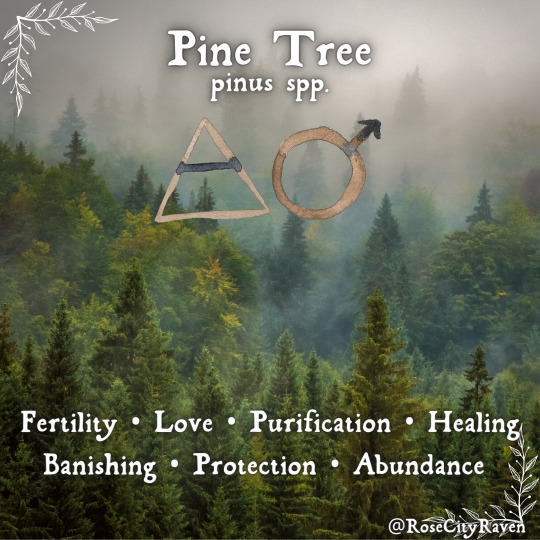
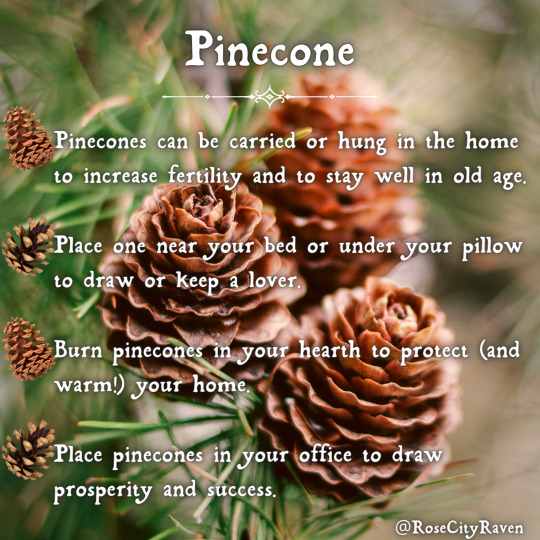
The Magic of the Pines & Correspondences 🌲
“In the pines, in the pines, where the sun never shines And you shiver when the cold wind blows”
--Dolly Parton
Pine Tree (pinus spp.)
Energy: Both hot & cold
Planet: Mars
Element: Air
Associated Deities: Aphrodite, Astarte, Attis, Cybele, Dionysus, Pan, Venus, The Horned God
Fertility • Love • Purification • Healing • Banishing • Protection • Abundance
There are around 115 types of pine trees and, aside from oak, pine trees are the most successful and widely ranging trees in North America. Pinyon pine nuts are edible and can be ground to make flour, pine oil is used as an antiseptic, pine rosin can be used in soaps and sealing wax, and some Native American tribes used pine gum to treat boils.
The ancient Romans used pine trees cut from sacred groves in a manner similar to modern-day Christmas trees. They would take the trees the night before Saturnalia and place them in temples to be decorated and used as a fertility symbol.
Dreaming of tall straight pine trees means that you will receive good news.
Pine needles can be burned to cleanse and purify the home (mix equal parts juniper & cedar) and to reverse spells and hexes made against you. Scatter the needles on the floor to drive away those with ill-intent. Add crushed pine needles to bath sachets in winter for a relaxing magical cleansing. They can also be used in sleep and dream sachets—just make sure they won’t poke through!
Use branches of pine to sweep an outdoor area before performing magic. Branches can also be placed above the bed to keep sickness away, above the entrance to the home to ensure continual joy within, and a cross of pinch branches or needles above the fireplace will keep evil from entering through it.
Pinecones can be carried or hung in the home to increase fertility and to stay well in old age. Place one near your bed or under your pillow to draw or keep a lover.
Burn pinecones in your hearth to protect (and warm!) your home.
Place pinecones in your office to draw prosperity and success.
To draw positivity and blessings to you tie a bundle of pine needles with thread and burn them. Pass pinecones through the smoke and place them on your altar or in a place you will see them often. Send grateful energy toward them as you pass by them and good things will flow toward you.
References: Cunningham’s Encyclopedia of Magical Herbs, Whispers from the Woods by Sandra Kynes, Magical Folkhealing by DJ Conway
#pine#pinecones#pinecone#witchcraft#magic#grimoire#book of shadows#cottagecore#witch tips#beginner witch#folk magic#folk healing#hearth witch#kitchen witch#green witch#aesthetic#faeriecore#goblincore#witchcore#spellcraft#spellwork#folk witchcraft#tree#forestcore
1K notes
·
View notes
Text
The earliest human writing includes multiple references to what we now call queerness, though I cannot easily access Dr Moudhy Al Rashid's thread on it because Musk broke twitter, here is the first tweet in the thread
As well as the translation of a hymn to Inana. We have always ALWAYS been here. Humans worshipped queer deities before the written word existed. What we now call queerness is a part of humanity always has been. Antiqueer beliefs however are a relatively modern and fundementally political invention.
Heres another article on the topic
We have always been here and always will be and to try and get rid of us is to attempt to destroy humankind itself.
Rocky Horror is turning 50 next month and people still act like being gay was invented by Ellen in 1997
127K notes
·
View notes
Text
Greek gods & goddesses ✨
☆ACHELOIS: A minor moon goddess whose name means “she who washes away pain”.
☆Alcyone: One of the seven, Pleiades and daughter of Atlas and Pleione. She bore several children with the god Poseidon.
☆ALECTRONA: An early Greek goddess of the sun, daughter of Helios and Rhode, and possibly goddess of the morning.
☆AMPHITRITE: Greek goddess of the sea, wife of Poseidon and a Nereid.
☆ANTHEIA: Goddess of gardens, flowers, swamps, and marshes.
☆APATE: Goddess of gardens, flowers, swamps, and marshes.
☆APHAEA: A Greek goddess who was worshipped almost exclusively at a single sanctuary on the island of Aegina in the Saronic Gulf.
☆APHRODITE: Goddess of love and beauty and married to Hephaestus.
☆ARTEMIS: Virginal goddess of the hunt and twin sister of Apollo.
☆ASTRAEA: Known as the “Star Maiden”, daughter of either Zeus and Themis, or of Astraeus and EOS and associated with the Greek goddess of justice, Dike.
☆ATÉ: Greek goddess of mischief, delusion, ruin, and folly.
☆ATHENA: Goddess of wisdom, poetry, art, and war strategy. Daughter of Zeus and born from his forehead fully grown, wearing battle armour.
☆ATROPOS: Eldest of the three Moirai, goddesses of fate and destiny (also known as The Fates). Atropos chose the mechanism of death and ended the life of each mortal by cutting their thread.
☆BIA: The goddess of force and raw energy, daughter of Pallas and Styx, and sister of Nike, Kratos, and Zelus.
☆BRIZO:Ancient Greek prophet goddess who was known as the protector of mariners, sailors, and fishermen.
☆CALLIOPE: One of the Muses, the muse of epic poetry, daughter of Zeus and Mnemosyne and the wisest of the Muses.
☆CALYPSO: Sea nymph who lived on the island of Ogygia, where she detained ODYSSEUS for several years. Generally said to be the daughter of the Titan ATLAS.
☆CELAENO: One of the Pleiades, and a wife of Poseidon. Said to be the mother of the sea god’s children Lycus and Nycteus
☆CETO: Primordial sea monster goddess, the daughter of Gaia and Pontus and mother of sea monsters.
☆CIRCE: A goddess of magic who transformed her enemies, or those that insulted her, into beasts.
☆CLIO: The muse of history and one of the nine muses known as “The Muses”. Like all the muses, Clio is the daughter of Zeus and the Titaness Mnemosyne.
☆CLOTHO: Youngest of the Three Fates and responsible for spinning the thread of human life.
☆CYBELE: The Greek goddess of caverns, mountains, nature and wild animals.
☆DEMETER: Goddess of agriculture, fertility, sacred law and the harvest.
☆DORIS: A sea nymph whose name represented the bounty of the sea. Mother of the Nereids.
☆EILEITHYIA: Goddess of childbirth, referred to by Homer as “the goddess of the pains of birth”.
☆ELECTRA: One of the seven daughters of Atlas and Pleione, known as The Pleiades.
☆ELPIS: The spirit and personification of hope. Hope was usually seen as an extension to suffering by the Greek, not as a god.
☆ENYO: Minor goddess of war and destruction, the companion and lover of the war god Ares and connected to Eris.
☆EOS: A Titaness and the goddess of the dawn.
☆ERATO: One of the Muses, the muse of lyric poetry, especially love and erotic poetry.
☆ERIS: Greek goddess of chaos, strife and discord and connected to the war-goddess Enyo.
☆EUTERPE: One of the Muses, the muse of music and lyric poetry.
☆GAIA: The primal Greek goddess of the Earth. Known as the great mother of all and often referred to as “Mother Earth”.
☆HARMONIA: The Greek goddess of harmony and concord.
☆HEBE: Goddess of eternal youth.
☆HECATE: The goddess of magic, crossroads, moon, ghosts, witchcraft and necromancy (the undead).
☆HEMERA: Primordial goddess of the day, daytime and daylight. Daughter to Erebus and Nyx (the goddess of night).
☆HERA: Goddess of goddesses, women, and marriage. Married to Zeus and known as Queen of the Gods.
☆HESTIA: goddess of the hearth, home, architecture, domesticity, family, and the state. Also one of the Hesperides.
☆HYGEA: Goddess of good health, cleanliness, and sanitation. This is where the word “hygiene” comes from.
☆IRIS: Greek goddess of the rainbow and messenger of the gods. She is also known as one of the goddesses of the sea and the sky.
☆KERES: The Keres were female spirits, the daughters of Nyx, the goddess of night.
☆KOTYSA: Dionysian goddess whose celebrations were wild and lascivious.
☆LACHESIS: Second of the Three Fates, the measurer of the thread of life woven by Clotho’s spindle which determines Destiny.
☆MAIA: Eldest of the seven Pleiades and the greek goddess of fields.
☆MANIA: Spirit goddess of insanity, madness, crazed frenzy and the dead.
☆MELPOMENE: One of the Muses. Originally the muse of singing, she then became the muse of tragedy.
☆MEROPE: One of the seven Pleiades and married to king Sisyphos of Ephyra.
☆METIS: Titan goddess of wisdom, an Oceanid, and the first great spouse of Zeus.
☆NEMESIS: The goddess of retribution and personification of vengeance.
☆NIKE: Goddess of victory, known as the Winged Goddess of Victory.
☆NYX: Primordial goddess of the night.
☆PEITHO: Greek goddess of persuasion and seduction.
☆PERSEPHONE: Goddess of vegetation and spring and queen of the underworld. Lives off-season in the underworld as the wife of HADES.
☆PHEME: The goddess of fame, gossip and renown. Her favour is notability, and her wrath is scandalous rumors.
☆POLYHYMNIA: One of The Muses, the muse of sacred poetry, sacred hymn, dance, and eloquence as well as agriculture, geometry and pantomime.
☆RHEA: Titaness and goddess of nature. Daughter of the earth goddess Gaia and the sky god Uranus, and known as “the mother of gods”.
☆SELENE: Goddess of the Moon, sometimes referred to as Luna and the ‘mother’ of vampires.
☆STEROPE: One of the seven Pleiades (the daughters of Atlas and Pleione) and the wife of Oenomaus – although according to some accounts, she is his mother by Ares.
☆STYX: Goddess of the river Styx and a Naiad who was the first to aid Zeus in the Titan war.
☆TAYGETE: A mountain nymph and one of the seven Pleiades.
☆TERPSICHORE: Goddess of dance and chorus and one of the nine Muses.
☆THALIA: One of the Muses, the muse of comedy and idyllic poetry.
☆THE ERINNYES: Goddesses of retribution and vengeance whose job was to punish men who committed heinous crimes.
☆THE GRACES: Goddesses of retribution and vengeance whose job was to punish men who committed heinous crimes.
☆THE MUSES: The nine Muses were the goddesses the arts.
☆THEMIS: Ancient Greek Titaness and goddess of divine order, law, natural law and custom.
☆THETIS: Sea nymph, goddess of water and one of the fifty Nereids, daughters of the ancient sea god Nereus. Also a shapeshifter and a prophet.
☆TYCHE: Goddess of prosperity and fortune.
☆URANIA: One of the Muses, the muse of astronomy and astrology.
🖤✨
197 notes
·
View notes
Text
Encanto characters as Greek Goddesses:
Alma: Gaia, the primal goddess of the Earth, known as the Great Mother of all, also known as "Mother Earth."
Pepá: Alectrona, goddess of the sun. OR Iris, goddess of the rainbow and messenger of the gods, also known as one of the gods of the sea and the sky.
Félix: Erato, a Muse, the Muse of lyric poetry, especially love and erotic poetry.
Bruno: Clotho, youngest of the Three Fates, responsible for spinning the thread of life, also dealing with destiny.
Julieta: Demeter, goddess of agriculture, fertility, sacred law, and the harvest.
Agustín: Hestia, goddess of hearth, home, architecture, domesticity, and family.
Dolores: Pheme, goddess of fame, gossip, and renow; her favour is notability, and her wrath is scandalous rumors.
Isabela: Antheia/ Apate, goddess of gardens, flowers, swamps, marshes.
Luísa: Bia, goddess of force and raw energy.
Camilo: Circe, the goddess of magic who transformed her enemies, or those who insulted her, into beasts.
Maribel: Hecate, goddess of magic, crossroads, ghosts, and witchcraft.
Antonio: Cybele, the goddess of caverns, mountains, nature, and wild animals.
28 notes
·
View notes
Text
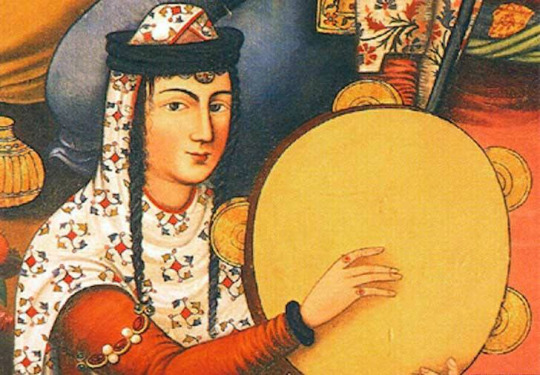
When The Drummers Were Women
By Layne Redmond
Yes, guys, there was a time in our history when the primary percussionists and drummers were women. The first named drummer in history was a Mesopotamian priestess named Lipushiau. She lived in the city-state of Ur in 2380 BC, which at that time had conquered all the surrounding city-states. She was the spiritual, financial and administrative head of the Ekishnugal, the most important temple in Ur dedicated to the moon god, Nanna-Suen. Her emblem of office was the balag-di, a small round frame drum used to lead liturgical chanting. In 2380 BC, Lipushiau ruled!
From the civilizations of Anatolia (Old Turkey), Mesopotamia, Egypt, Greece and Rome, the Goddess and the frame drum emerge as the core trance and mystical religious traditions. The frame drum was once at the center of the oldest rave like gatherings — it was the oldest technology for altering consciousness. The mystery rites would last for days at a time with nonstop drumming and dancing. Get this in perspective — this was church. Quite a different religious experience than I had growing up! A frame drum is defined by the diameter of the drumhead being much larger than the depth of its shell. The shells range in depth from 2" to at most 6". They range in diameter from 4" to 30". Most of these drums are portable and can be held in one hand.
The frame drum most often has a skin on only one side but sometimes it may have skins stretched across both sides. Bells or jingling and rattling implements may be attached to the inside rim, and in ancient times were believed to add to the drum’s power to purify, dispel and summon. Very often the drums were painted red, the color of blood, or sometimes green, the color of vegetation, the primordial colors of life. Mystical designs and symbols might also be painted on the skin head or the wooden frame. Threads or ribbons knotted with ritual prayers or chanting often hung from them.
Although this frame drum is similar in appearance to the shaman’s drum found throughout Asia and North America, there is a major difference in how they are played. The shaman’s drum is struck with a bone, horn or stick. The Mediterranean frame drum is played with the bare hands. While striking a drum with a stick gives a single deep resonant sound, finger techniques allow more variety: a deep, open tone, a slap, a high-pitched rim sound, or a soft brushing sound. This difference in stroke technique has led to differences in construction. The inner edge of the rim of the Mediterranean frame drum is often beveled and its skin is usually thinner, to enhance the sounds produced by fingers and hands. Hand or stick? I have not been able to determine which technique is older - the shaman’s drum played with a stick or the frame drum played with bare hands. The use and basic constructions of the drums are so similar that they probably both grew from the same root techniques of altering consciousness. In every ancient Mediterranean civilization I studied, it was a goddess who transmitted to humans the gift of making music. In Sumer and Mesopotamia it was Inanna and Ishtar; in Egypt it was Hathor; in Greece, the nine-fold goddess called the Muse. Musical, artistic and poetic inspiration was always thought to spring from the Divine Feminine. One of the main techniques for connecting to this power of inspiration was drumming.
The drum was the means our ancestors used to summon the goddess and also the instrument through which she spoke. The drumming priestess was the intermediary between divine and human realms. Aligning herself with sacred rhythms, she acted as summoner and transformer, invoking divine energy and transmitting it to the community.
The earliest known depiction of any drum was painted on a shrine room wall in 5600 BC in a Neolithic city in what is now Turkey. The shrine room wall depicts a group of ecstatically dancing figures, some of which appear to have percussion instruments. A band of human figures clad in leopard skins play various percussion instruments as they dance ecstatically around a large bull. One figure holds a horn-shaped instrument in one hand and a frame drum in the other. Other figures carry what look like shakers or rattles, as well as bowed instruments similar to the Brazilian berimbau. The excavating archaeologist, James Mellaart, has unearthed numerous other shrines in this city honoring a great goddess, and he believes that primarily priestesses tended these shrines. To date, the wall painting is our oldest evidence of a goddess-based tradition in which the frame drum was used in ecstatic rituals.
From 3000 to 2500 BC, written records of the Sumerians describe the goddess Inanna as the creator of the frame drum, along with all other musical instruments. They tell of Inanna’s priestesses who sang and chanted to the rhythms of round and square frame drums. Along with the written texts, numerous figurines of women playing small frame drums have been found. These drumming rituals were carried on in the later worship of Ishtar, Asherah, Ashtoreth, Astarte, and Anat in Mesopotamia, Phoenicia, Palestine and Assyria. Somewhere between 2000 and 1500 BC, the frame drum arrives in Egypt. James Blades reports, “All records from this period (Middle Kingdom) show the performers as women; in fact the whole practice of the art of music appears to have been entirely entrusted to the fair sex, with one notable exception, the god Bes, who is frequently represented with a drum with cylindrical body (frame drum).
”Another text described the priestesses as the composers and choreographers of the music and dance used on religious occasions. In the Cairo Museum there is an actual rectangular double-headed frame drum from 1400 BC that was found in the tomb of a woman named Hatnofer. Also surviving from the Ptolemaic period is the skin head of a frame drum on whose surface is painted a woman playing a frame drum in front of the goddess Isis. The inscription on the drum reads, “Isis, Lady of the Sky, Mistress of the Goddesses.”
It is important to comprehend the significance of women’s control of sacred music and dance in Egypt. Religious ceremonies based on music and dance can synchronize the underlying energy of the mind and directly influence our perceptions of reality. Ritual influences our modes of awareness that both underlie and transcend the normal patterns of consciousness. Rites can be used to rouse and shape group emotion and behavior, developing a continuous shared consciousness. Music vibrationally transmits states of mind directly from consciousness to consciousness. Thus, politically, music can resonate simultaneously on far more levels — emotional, spiritual, intellectual and physical — than can words alone. As music initiates changes in group consciousness, it can affect vast social and economic cycles.
The Biblical lands have also yielded numerous images of women playing the frame drum. Old Testament texts refer to the tambourine as the toph, which as been translated as the timbrel and the tabret. Exodus 15:20, “And Miriam, the prophetess, sister of Aaron and Moses, took a timbrel in her hand, then the women went out after her with timbrels and with dances.” In some legends it is said that Miriam parted the Red Sea with the shamanistic power of her drumming.In Greece, some of the most beautiful representations of the frame drum are found on the red figured vase paintings from the fifth century BC. The frame drum entered Greece from several different directions — from Cyprus, one of the main centers of the cult of Aphrodite where the frame drum was prominent from at least 1000 BC, and also from Crete, where it was used in the rituals of Ariadne, Rhea and Dionysos.
Pre-classical Greece also saw the introduction of the cult of the goddess Cybele, from Western Anatolia. The tympanum, the Greek frame drum, was the main instrument of the maenads, the women initiates, in the worship of Cybele and Dionysos, and the priestesses of Artemis, Demeter and Aphrodite also played them. Both single-headed and double-headed frame drums appear, once again played almost exclusively by women.
The Romans saw the last great flowering of these rites when the religion of Cybele was brought to Rome in April of 204 B.C. She was described as, “Cybele, the All-Begetting Mother, who beat a drum to mark the rhythm of life.” Rome was the cultural center for the mystery religions of Cybele, Dionysos, Isis and Dea Syria — all of which used the frame drum in their ecstatic rituals. These practices flourished until the Roman Empire officially adopted Christianity in the fourth century A.D.
In the ancient world, prayer was an active, trance-inducing combination of chanting, music and dance, and initiates often danced the sacred spiral into the labyrinth. The classic labyrinth is a single path meant for meditative circling. To enter it is to experience a ritual death; to escape from it is to be resurrected. The danced line into the labyrinth was a sacred path into the inner realm of knowing. Dancers holding a rope signifying Ariadne’s thread (that allows participants to find their way in and out of the maze) followed a leader into the labyrinth, spiraling right to left, the direction of death. At the center they turned, dancing out in the direction of evolution and birth, all to the driving rhythms of the frame drums. Another function of the frame drum was to create a prophetic trance state in which the priestess could foretell the future. The most dramatic mode of prophecy was uttered in inspired rhythmic speech. In the depths of ecstatic trance, the oracle was possessed by the goddess, who rapped in powerful rhymes directly through her lips. The Greek word for this state of transfigured consciousness is enthusiasmos – “within is a god” – the root of our word enthusiasm.
Ecstatic prophecy has many parallels with shamanism. Prophetesses sought inspiration through a number of external stimuli, including fasting, ingesting honey, inhalation of burning herbs or essential oils and intoxication via alcohol or psychotropic plants. Cybele’s priestesses relied most heavily on the trance-inducing properties of music and dance. The rhythms of frame drums, cymbals and flutes moved them towards the consecrated, concentrated state of divine revelation.
The Dionysian rites are the most widely known of all the mystery schools and have an enduring reputation as drunken sexual orgies. This is due to the later descriptions by Christian political leaders to whom the ancient mysteries of the goddess along with ecstatic drumming, dancing and in this century, rock and roll, have been labeled devil worship. Our word “orgy” comes from orgia, derived from the root word meaning “deed.” The term was used for the celebrations following initiation in mysteries, which might or might not include sexual imagery or behavior. Its ancient connotation seems to have been simply “secret rites.” Their aim was the ecstatic transformation of consciousness through rhythmic movement of the body.
Historians have associated the maenads, priestesses of Dionysos and Cybele, with unbridled sensuality and socially uncontrolled behavior. The word maenad means “mad women.” Their erotic longing for union with the Divine found expression in wild, barefoot dances to the primordial music of flute and drums, their unrestrained hair flying wildly about their faces, snakes wrapped around their arms. According to some reports they drank blood and tore wild beasts limb from limb. Not too far out of line from what might take place at a contemporary summer rock festival!
Wine was indeed an important part of the Dionysian mysteries. External stimulants were always used in pursuit of higher consciousness, for divine intoxication with the spirit of the deity. References to drinking blood may actually allude to a communion rite in which the fruit of the grape represented the blood of the deity, as it does today in Christian communion rites.
Mastery of the precise musical rhythms required to align the devotees’ consciousness with divinity suggests a control and sophistication of technique that contradicts the historical image of wanton frenzied women. Creating rhythms powerful enough to move hundreds of people into ecstatic trance states required skill, discipline and endurance.
With the ascendancy of Christianity, Cybele’s great temple in Rome was destroyed, the Vatican was built on the site and the new priesthood banned the priestesses, instruments and music associated with her rites. Not only was the frame drum banned from Christian religious rituals, its use in secular contexts was also frowned upon by the Church, in particular its use by women. The Catholic synod of 576 (commandments of the Fathers, Superiors and Masters) decreed: “Christians are not allowed to teach their daughters singing, the playing of instruments or similar things because, according to their religion, it is neither good nor becoming.
”For 3,000 years women had been the primary percussionists in the ancient world. As Europe pursued this policy of disallowing women to learn music, they effectively barred them from the professions of composing, teaching or performing.
The last 30 years have seen a dramatic rise in the number of professional women musicians, but there are still few women pursuing drumming. Although little is known about the history of frame drums and the women musicians who played them, it is an important part of our percussive history. And the ancient traditions of using drumming for spiritual purposes can point out what we have lost.
At contemporary rock concerts we have all the trappings of ritual without the spiritual purposes. Flashing trance-inducing lights, loud rhythmic sound, chanted and sung words, but often with no higher purpose than to momentarily entertain or to glorify the individual performer. And no matter how much idolization some of these quite gifted musicians attain, they are often driven to attempt to fill the emptiness with drugs and alcohol.
Yet I remember concerts that hinted at the search for wider realms and dimensions of being. The first concert I ever saw was a show by the Monkees. But what blew me away was the opening act — Jimi Hendrix. I had no frame of reference for where he was taking me. I soared with him beyond the known on the piercing sounds and songs of his guitar. Yet in the end he burned and beat that beautiful guitar to pieces. I had experienced something profound and transformative, but it had ended in destruction, leaving me bewildered and yearning for something more. I have spent the rest of my life looking for the pathway into the ecstatic that leaves me transformed, whole and euphoric.
This article was Originally published in DRUM! Magazine’s December 2000 Issue
76 notes
·
View notes
Text
Finally found that meme. Now try not to cringe (or break something):

Authoritarian Left Square
Demeter
Seeming harmless, is actually the most terrifying of all in the Pantheon;
Directly responsible for most famines throughout history;
Once cursed a man with eternal hunger;
Haaaaaaates Hades;
Phobos and Deimos
Knock Knock;
It's Fear and Terror;
We're your secret police;
Cronus (already wrote what this guy said about him)
Nyx
The Night which envelops us all;
Born near the dawn of creation itself;
Terrifying and formless progenitor of half this chart's gods;
Nemesis
Goddess of revenge;
Hunts down all those excessive hubris with extreme predjudice;
Tyche's evil sister;
Athena
Goddess of craft, wisdom and the strategic side of war;
Somehow more of a sociopath than Ares;
Birthed from father's head, a Theory given flesh;
Cybele
Magna Mater;
MAGNA MATER;
Demands undying loyalty;
Will actually take away your penis;
Hephaestus
Hideous god of the forge, and working class icon;
Parents gave him raw deal;
Literal cuckhold;
Morpheus
The original Sandman;
Lord of Dream;
Largely apolitical, but gives an oft-unwanted service for absolutely free;
Authoritarian Right Square
The Fates
Control all;
Weave all;
Kill all;
Bind even Olympians in threads of destiny;
Hera
Queen of the Gods, standing for Marriage and Authority;
Always blames husband's victims;
She and her servants are always watching;
Zeus
King of the Gods, Sky God and prototypical monarch;
In fact, invented Royal Incest;
Hurled his thunderbolt;
Ares
'ate peace;
'ate harmony;
'ate ceasefire;
luv war;
luv blood;
luv 'Dite;
Simple as that;
Helios and Selene
Ancient deities of Sun and Moon;
Possibly pre-greek?
Aren’t seen much today;
Poseidon
Absolute overlord of ocean and seas;
Swallows communists into the depths;
Don't piss him off;
Hestia
Traditionalist goddess of hearth and home;
Perpetually chaste and virginal;
Stays neutral in all conflicts;
Nike
Goddess of victory, success and triumph;
Friends with Zeus and Ares;
Really, really likes cheap Chinese labour;
Ouranos
The Heavens themselves, first ruler of the Universe;
Tradition mutilated and forgotten;
I'm not going to make the joke;
Libertarian Left Square
Hecate
Goddess of Magic, teacher of witches;
Ancient dweller in the Underworld;
Really, really likes dogs;
Zephyrus
God of the Western Wind, gentlest of the 4;
Heralds the coming spring;
Early LGBT hero;
Astraea
Goddess of Justice, Innocence and Purity;
Sweet Summer Child;
Archetypical virgin, inspiration for the constellation;
Artemis
The Huntress, protector of nature and young girls;
Leads a hunt of (nearly) undying loyalty;
Enjoys turning people into animals;
Iris
Goddess of the Rainbow;
Messenger of the Gods before Hermes was born and took her job;
Probably either gay or extremely high;
Dionysus
God of emotion, chaos, insanity, ectasy and wine;
Brings love to keep you solace in the darkness;
Entwined to Apollo;
Pan
God of the Wilds, the Flocks and the Shepards;
Great musician;
Invented Panic and thaught shephards how to jack off;
May be hive mind of the smaller Satyr gods;
Visits his communal gay furry orgies!
Might be dead...
Aphrodite
Goddess of Love, Beauty and Pleasure;
Can seduce anyone, for better or worse;
Multiple forms, diverse origin story;
Aggressive shipper;
Hermes
God of messengers, travelers and thieves;
Stealing things since the day he was born;
Divine trickster who'll find his way into every myth;
Libertarian Right Square
Hypnos
Zzzzzzzzzz;
Politics just put me to sleep;
Is actually death's brother;
Heracles
Pulled himself up by snake-skin boots from Mortality to Godhood (with a little help from Daddy);
Ran huge merch line, according to the Mouse;
Really liked younger men;
Charon
Ferryman of the Dead across river Styx;
Just wants your money;
The very last price you'll ever pay;
Apollo
God of rational thought, logic, healing, prophecy, the sun and light;
Brings truth and understanding;
Entwined with Dionysus;
Tyche
Goddess of fortune and chance;
She'll give you city success and plenty;
At least for a time...
Atlas
Must I explain this?
Eris
Has inspired entire lib-center philosophies;
Caused the Trojan War for shits and giggles;
Honestly the most based deity;
Eros
God of fierce love and desire;
Greatest franchising of any god;
Existence seem to prove certain... claims of some Lib-Right;
Hades
As Pluto, he's "The Rich One"...
Lives in an underground cave with his guard dog and teen wife;
Don't eat his food;
Feel free to criticize this meme as much as you please;
I just saw a wojak meme where Cronus was labeled as a Communist because, and I quote:
Sikle-wielding Leader of the Titans and Master of Time;
In charge of nostalgic Golden Age which actually sucked;
"The revolution devours its children."
I really hope this was a joke and dude wasn't 100% serious, because what the hell?!
And look, I don't want my post to turn into some political shit, but claiming that a deity that was worshipped hundreds of years before Karl Marx was even born is a communist is just as absurd as claiming that "X god was a feminist." or "Y deity was the patron of the LGBT Community." All of these appeared very late historically speaking.
8 notes
·
View notes
Text
Greek Deities (female)
Female
ACHELOIS - A minor moon goddess whose name means “she who washes away pain”.
ALCYONE - One of the seven, Pleiades and daughter of Atlas and Pleione. She bore several children with the god Poseidon.
ALECTRONA - An early Greek goddess of the sun, daughter of Helios and Rhode, and possibly goddess of the morning.
AMPHITRITE - Greek goddess of the sea, wife of Poseidon and a Nereid.
ANTHEIA - Goddess of gardens, flowers, swamps, and marshes.
APATE - Goddess of gardens, flowers, swamps, and marshes.
APHAEA - A Greek goddess who was worshipped almost exclusively at a single sanctuary on the island of Aegina in the Saronic Gulf.
APHRODITE - Goddess of love and beauty and married to Hephaestus.
ARTEMIS - Virginal goddess of the hunt and twin sister of Apollo.
ASTRAEA - Known as the “Star Maiden”, daughter of either Zeus and Themis, or of Astraeus and EOS and associated with the Greek goddess of justice, Dike.
ATE - Greek goddess of mischief, delusion, ruin, and folly.
ATHENA - Goddess of wisdom, poetry, art, and war strategy. Daughter of Zeus and born from his forehead fully grown, wearing battle armour.
ATROPOS - Eldest of the three Moirai, goddesses of fate and destiny (also known as The Fates). Atropos chose the mechanism of death and ended the life of each mortal by cutting their thread.
BIA - The goddess of force and raw energy, daughter of Pallas and Styx, and sister of Nike, Kratos, and Zelus.
BRIZO - Ancient Greek prophet goddess who was known as the protector of mariners, sailors, and fishermen.
CALLIOPE - One of the Muses, the muse of epic poetry, daughter of Zeus and Mnemosyne and the wisest of the Muses.
CALYPSO - Sea nymph who lived on the island of Ogygia, where she detained ODYSSEUS for several years. Generally said to be the daughter of the Titan ATLAS.
CELAENO - One of the Pleiades, and a wife of Poseidon. Said to be the mother of the sea god’s children Lycus and Nycteus
CETO - Primordial sea monster goddess, the daughter of Gaia and Pontus and mother of sea monsters.
CIRCE - A goddess of magic who transformed her enemies, or those that insulted her, into beasts.
CLIO - The muse of history and one of the nine muses known as “The Muses”. Like all the muses, Clio is the daughter of Zeus and the Titaness Mnemosyne.
CLOTHO - Youngest of the Three Fates and responsible for spinning the thread of human life.
CYBELLE - The Greek goddess of caverns, mountains, nature and wild animals.
DEMETER - Goddess of agriculture, fertility, sacred law and the harvest.
DORIS - A sea nymph whose name represented the bounty of the sea. Mother of the Nereids.
EILEITHYIA - Goddess of childbirth, referred to by Homer as “the goddess of the pains of birth”.
ELECTRA - One of the seven daughters of Atlas and Pleione, known as The Pleiades.
ELPIS - The spirit and personification of hope. Hope was usually seen as an extension to suffering by the Greek, not as a god.
ENYO - Minor goddess of war and destruction, the companion and lover of the war god Ares and connected to Eris.
EOS - A Titaness and the goddess of the dawn.
ERATO - One of the Muses, the muse of lyric poetry, especially love and erotic poetry. ERIS - Greek goddess of chaos, strife and discord and connected to the war-goddess Enyo.
EUTERPE - One of the Muses, the muse of music and lyric poetry.
GAIA - The primal Greek goddess of the Earth. Known as the great mother of all and often referred to as “Mother Earth”.
HARMONIA - The Greek goddess of harmony and concord.
HEBE - Goddess of eternal youth.
HECATE - The goddess of magic, crossroads, moon, ghosts, witchcraft and necromancy (the undead).
HEMERA - Primordial goddess of the day, daytime and daylight. Daughter to Erebus and Nyx (the goddess of night).
HERA - Goddess of goddesses, women, and marriage. Married to Zeus and known as Queen of the Gods.
HESTIA - goddess of the hearth, home, architecture, domesticity, family, and the state. Also one of the Hesperides.
HYGEA - Goddess of good health, cleanliness, and sanitation. This is where the word “hygiene” comes from.
IRIS - Greek goddess of the rainbow and messenger of the gods. She is also known as one of the goddesses of the sea and the sky.
KERES - The Keres were female spirits, the daughters of Nyx, the goddess of night.
KOTYS - A Dionysian goddess whose celebrations were wild and lascivious.
LACHESIS - Second of the Three Fates, the measurer of the thread of life woven by Clotho’s spindle which determines Destiny.
MAIA - Eldest of the seven Pleiades and the greek goddess of fields.
MANIA - Spirit goddess of insanity, madness, crazed frenzy and the dead.
MELPOMENE - One of the Muses. Originally the muse of singing, she then became the muse of tragedy. MEROPE - One of the seven Pleiades and married to king Sisyphos of Ephyra. METIS - Titan goddess of wisdom, an Oceanid, and the first great spouse of Zeus.
NEMESIS - The goddess of retribution and personification of vengeance.
NIKE - Goddess of victory, known as the Winged Goddess of Victory.
NYX - Primordial goddess of the night.
PEITHO - Greek goddess of persuasion and seduction.
PERSEPHONE - Goddess of vegetation and spring and queen of the underworld. Lives off-season in the underworld as the wife of HADES.
PHEME - The goddess of fame, gossip and renown. Her favour is notability, and her wrath is scandalous rumors.
POLYHYMNIA - One of The Muses, the muse of sacred poetry, sacred hymn, dance, and eloquence as well as agriculture, geometry and pantomime.
RHEA - Titaness and goddess of nature. Daughter of the earth goddess Gaia and the sky god Uranus, and known as “the mother of gods”.
SELENE - Goddess of the Moon, sometimes referred to as Luna and the ‘mother’ of vampires.
STEROPE - One of the seven Pleiades (the daughters of Atlas and Pleione) and the wife of Oenomaus – although according to some accounts, she is his mother by Ares.
STYX - Goddess of the river Styx and a Naiad who was the first to aid Zeus in the Titan war.
TAYGETE - A mountain nymph and one of the seven Pleiades.
TERPSICHORE - Goddess of dance and chorus and one of the nine Muses.
THALIA - One of the Muses, the muse of comedy and idyllic poetry.
THE ERINNYES - Goddesses of retribution and vengeance whose job was to punish men who committed heinous crimes.
THE GRACES - Goddesses of retribution and vengeance whose job was to punish men who committed heinous crimes.
THE MUSES - The nine Muses were the goddesses the arts.
THEMIS - Ancient Greek Titaness and goddess of divine order, law, natural law and custom.
THETIS - Sea nymph, goddess of water and one of the fifty Nereids, daughters of the ancient sea god Nereus. Also a shapeshifter and a prophet.
TYCHE - Goddess of prosperity and fortune.
URANIA - One of the Muses, the muse of astronomy and astrology.
Information found on: https://greekgodsandgoddesses.net/goddesses/
104 notes
·
View notes
Text
DEITIE IDEAS
⚜Athena: war, wisdom, crafting⚠️
💋Aphrodite: love, sex, beauty, fertilty 💞
🖤Achyls: Sadness, misery, depression, suicide😔
💧Amphitrite: of the sea, sealife, waves, calm waters💧
🏞Artemis: hunting, wildlife, wilderness, nature, survival🏹
☀️Alectrona:personification of the sun, light, warmth,🌤
🌕Achelois: moon godess name means washes pain away🌓
🌵Antheia: garden, greenery, plants, flowers, swamps,🌸🌺
🤪Até: godess of chaos, war, mischief, delusion, ruin, folly⚠️
B
🔮Bia: goddess of pure, force, and raw energy♾
🥽Brizo: protector of marines, sailors, and fishermen💧
C:
💧Calypso: sea nymph, mother of fish and, sealife💧
🧜♀️Celeano: wife of poseidon, mother of sea gods, 🤱
👽Ceto: primordial sea monster, daughter of Gaia scaryyy🌊
⚜Circe: Magic, sorcery, transformed enemies into swine🧹
⛰Cybele: mountains, caverns, nature, wildlife⛰
💫Clymene: Renown infamy, fame, very well known💫
D:
⚖Demeter: sacred law, agriculture,fertility. The harvest🎑
💧Doris: Sea nymph, bounty of the sea, mother of nereids💧
E:
👶Eilethyia: childbirth, by Homer goddess of pain of birth🤱
🤗Elpis: Hope, and spirit, personification 😀
⚠️Enyo: Destruction, war, companion and lover of ares ⚠️
🧚♀️EOS: goddess of dawn, primordial personification🌅
🎵Erato: muse of lyric, poetry, music, tune, noise🎵
🔞Eris: chaos, strife, and discord connected to war goddess enyo .
🐍Eurayle: Sister of Medusa, one of the main gorgon👽
G:
🌺Gaia: primordial goddess of Earth, nature, mountains🌵
H:
👋Harmonia: greek goddess of harmony, concord🤗
👶Hebe: Eternal youth,in charge of making the gods look good🤗
🔮Hecate: Witchcraft, Crossroads, necromancy, mother of witches🔮
🌅Hemera: Goddess of Day time, and daughter of Nyx🌓
⚜Hera: Goddess of goddesses, women, and marriage 💑
🏡Hestia:Hearth, home comfort, domesticity, family,🏡
🧼Hygea: Hygiene, health, cleanliness, sanitation 🧼
I:
🌈Iris: rainbows, color, messenger of the gods, sea🌈
K:
🌓Keres: Daughter of Nyx, female essence,🌓
🥳Kotys: dyonisian goddess whose celebrations were BIG🥳
L:
🍒Lilith:Wife of Lucifer, First wife of adam, Sex, Women🌹
⚠️Lamia:Chd eater, figure of bad behavior, cannablism⚠️
☠Lachesis:second of three fates, measurerof thread of lif☠
M:
🛤Maia: Greek goddess of Fields, crossways🛤
🤡Mania: isanity, madness, crazed frenzy, and the dead☠
😩Melepomene: Muse of grieve, loss, tragedy🖤
🧠Metis: Goddess of knowledge, wisdom, oceanic🧠
N:
😈Nemesis: Goddess of revenge, vengeance, retribution😈
✔Nike: Goddess of Victory, winged goddess of victory ✌
🌓Nyx: Preimordal goddess of night, lunar goddess, dark🌕
P:
🗡Persephone:Queen of underworld, vegetation,springs🗡
🤳Pheme: Gossip, Fame, notability, renownciation🗣
📝Polyhmnia: Scared poetry, writing, hymn dancing 💃
R:
🏜Rhea: Titaness of nature, Daughter of Gaia and Uranus🌎
S:
🌕Selene/Luna:Mother of the Moon, mother of vampires,🌓
🏞Styx: Goddess of the river styx, portal to underworld🏞
🗻Taygete: Mountain Nymph/ Goddess 🗻
🎵Terpsichore: Dance and chorus, one of the nine muses👯♀️
😆Thalia: One of 9 muses, She is of comedy idyllic poetry😆
⛩ The Erinnyes: Retribution, vengeance, punish men, heinous crimes.
⚖Themis: divine order, and law, custom⚖
🤑Tyche: Prosperity, money, luck, fortune💸
U:
🔭Urania: Goddess of astronomy and astrology♎
🤢Eurayle: Third Gorgon sister👽
IMPORTANT NOTES!!!
🍒Lady Lilith wasn't evil she was damned to hell because she wanted equality between men and women but to no prevail she ran away ain't hidden mountains and we. God sent angels to being her back to Eden she said no unless she would gain equality making her the first feminist in the universe🍎
45 notes
·
View notes
Text
King Midas: the true story about how an ancient king’s golden touch turned a river into gold

Paktolos River
Here is where it all started!
In the gateway where east meets west.
The region of Anatolia, although situated in one of the driest regions in modern days “Turkey” and surrounded mostly by steppe vegetation , except for the forested areas in the south, the earth here is remarkably fertile.
This culturally rich region has seen a long line of important civilizations including several great Empires.
It is in this land of honey, pears, muskat grapes and “gold”, where our story begins.
The Phrygian civilization and its kings soon realised that the western plateau of Asia Minor was blessed with several important assets.
Thanks to its fertile lands, strategic position (between the Persians and the Greek) and the skilled and hardworking metalworkers and potters, it soon grew into an Empire.
In ancient times the Anatolia region, Phrygia and Assyria included, was famous for making brass and other metalwork as early as 3000 B.C.
To make brass they mixed zinc with copper. The zinc was obtained by heating a metal called calamite.
As brass is obtained by alloying zinc and copper by mixing and crushing these metals, the Anatolian workers crushed the ore with the help of wheels and simple mechanical mixers.
Nevertheless the Phrygians had a secret to their brass making. Their brass was more shiny, glancing and unique than the rest of the brass in the area. It was strikingly similar to gold!

Brass Vessles
The Phrygian brass making was famous and Phrygia prospered. During these prosperous times the king of Phrygia who was ill and in poor health still lacked a successor.
He informed his advisors that he intended to give the throne to the first man who entered the city gates in a wagon pulled by three oxen.
Time went by and finally a man appeared in a wagon pulled by three oxen.
It was Gordios and when asked, he accepted the offer. He was overly grateful for the trust he was shown and as a symbol of his gratitude to the king and as a promise to the people, he tied a knot to his wagon.
This was a special and very complicated knot, then he said; as gratitude I have tied a knot between me and the citizens of Phrygia. The one who is able to untie the knot gains the rule and is destined to rule Asia.
Here from the expresion “to tie the Gordon knot”.
This is how Gordon, the commoner, became Emperor. Under his rule the already prosperous Phrygia flourished even more.
The citizens in turn wanted to show their gratitude to Gordion, as well so they named their capital “Gordium” in his honor.
Gordion ordered the construction of many impressive palaces, fortification walls, buildings and tumultombs at Gordium.
He married Cybele and they conceived at least one son Midas.
Furthermore he refined the already impressive brass making thus it became the finest in the world at that time.

Golden embroidery
He is also accredited for the development of golden embroidery on garments and materials.
First the clothes were dyed in gurtiti or ochre to obtain an ochre or yellowish colour. Yellow dresses were exceptionally popular by women at the time. These garments were later embroidered with golden threads, they gained so much popularity, they became a status symbol for the high class in the area.
At the age of sixty, Gordion died of natural causes and was put to rest. After a generous funeral feast, which remains were found in his burial chamber, together with lavish bronze pottery vessels and bronze fibulae, he was put inside a wooden chamber, the oldest standing wood structure in the world. The wood has been counted by ringing and is from 740 B.C.
The wooden chamber was found inside a burial mount, one the largest in Anatolia , it took 1000 people 1.5 years to build.
The grave was found in 1957 by a group of archaeologists.
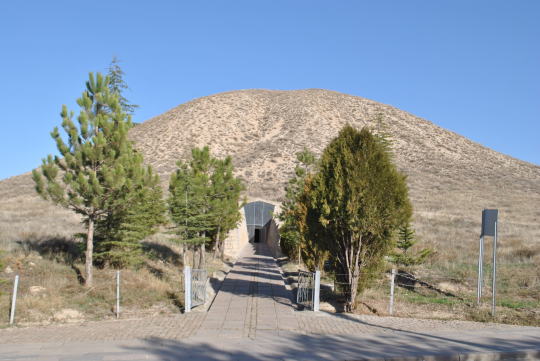
Tummbulus, burial of Gordion
Gordion and the Phrygian Empire had been a strong ally to Troy during the famous “Troyan war”.
He had fought alongside the Troyans against Achaeans.
It was now Midas turn to continue his fathers dreams.
Inscriptions in Gordium tell that Midas was crowned here shortly after his fathers death.
Midas was beyond any doubt the greatest, richest and most famous of all Phrygian kings and emperors ever !!!
He was also to be the last independent ruler of Phrygia.
He is the king with the golden touch.
Midas ruled over his people from a lavish castle in Gordium encircled by a beautiful garden of wild roses.
The famous Greek Herodotus wrote in his book; The garden of Midas, son of Gordion, where the roses grew wildly and each bearing sixty blossoms of surpassing fragrance.
Herodotus claims to have met king Midas and seen his wild rose garden, personally.
The Phrygian Emperor further founded at least two cities, “Midaeum” named after him and the city of Angora (named so until 1930, then Ancyra to later become Ankara).
Angora or Ankara is the origin of both angora wool (from angora rabbits) and mohair wool (from angora goats)unrelated to the wool; the angora cats also have their origins in the same city.

Rose Garden
Midas indisputably greatest achievement was the development and production of coins. One of the earliest in the world. This invention was later passed down to the Empires of Lydia, Persa and finally to the Roman Empire who spread the invention of coins throughout Europe.
The credit for this historical invention and the way it changed history, is given to Midas.
The origins of the whole coin making process is found in the river Paktolos (today’s Turkish name is Sart Çayı).
The river rises from mount Tmolus, flows through (the ruins of)
the city of Sardis and later empties into the Gediz Nehri river, the ancient “ Hermus”.
The river Paktolos contained electrum, an alloy of gold with at least 20% silver, used to make coins. In alchemy the transmutation of an object into gold is known as chrysopoeia.
To obtain the electrum from the river, Midas and his people placed sheep skins that were left for a few days then recollected.

River Paktolos
Midas continued to rule the Empire the same way and with the same values as his father.
Continuous wars were fought against his archenemies the Assyrians and the Urartus.
The Assyrians called him “Mita of Mushki”. The reason for this was that the Phrygians originated from a place in Macedonia with that name.
During large periods of time these conflicts hindered his access to the Mediterranean Sea that was of utmost importance for Phrygian trade. As a solution Midas married a Greek Princess “ Damodice” daughter of Agamemnon of Cume, the problem was solved , he got permanent access to the Mediterranean and an ally and business partner.
However in the late 600’s B.C Phrygia was attacked by the Cimmerians who plundered, destroyed and burned Gordium. After the fall of Phrygia, the region came under Lydian suborderance followed by Persian, Seleucidian ( general of Alexander the Great) and Roman rule.
What happened to Midas in the middle of all this is unclear but some rumours say that he drunk poisoned ox blood and died.
Others say he lived for a short period after the invasion and died of natural causes after that.
Greek mythology.
The story about king Midas that is most commonly known, is the one in the children books, which is based on Greek mythology.
The Greek philosopher Aristotle of Stagira (384-322B.C) tells the story about king Midas. According to the myth; King Midas was walking in his famed rose garden when he came across a drunken Satyr, the Satyr was Silenus or Sílenos. Midas helped him, gave him a meal and a bed to rest.
Later on the Satyrs master Dionysus, Greek god of wine, found him with Midas. The god was grateful that Midas had taken good care of his friend so he granted Midas a wish.
Midas wished that everything he touched would turn to gold.
To his disappointment he discovered that even the food he was about to eat turned to gold before he could eat it.
Aristotle goes on to tell that King Midas starved as a result of the wish and died a slow, painful death.
According to the Romans the story has a different ending.
Publius Ovidius Naso (43 B.C- 17 A.C) tells that king Midas repents his greediness and begs Dionysus to take the golden touch back.
Dionysus agrees and orders Midas to wash his hands/ bath in the river Paktolos (today Sart Çayı).
Midas follows the instructions and the golden touch washes away.
For centuries to come the waters were filled with gold, thereby making the later rulers of Phrygia fabulously wealthy.
King Midas was a historical king of the kingdom of Phrygia in Asia Minor.
He ruled a very powerful country and a wealthy Empire. He couldn’t literally turn things to gold but abstractly and symbolically, yes!
The Phrygian brass “looked like gold” , their gold embroidery was the first and finest in history, moreover they were one of the first countries to produce gold coins.
The stories about him wishing for the ability to turn everything he touched to gold arose from Greek mythology based on the alleged fabulous riches of Phrygia.

Gordian Knot
What happened to the Gordian knot?
The ox-cart still stood in the palace in Phrygia in the fourth century when Alexander the Great arrived. Alexander wanted to untie the knot but struggled to do so.
He reasoned that it would make no difference how the knot was loosened so he drew his sword and cut the knot in half with one single stroke.
Even though his solution is disputed, it is known ever since that cutting the Gordian knot means; finding a quick solution to an unsolvable problem.
Ancient Anatolia.
Prehistoric cultures of Anatolia.
The Neolithic period.
The Chalcolitic period.
Early Bronze Age.
The old Hittite kingdom.
The middle Hittite kingdom.
The Hittite Empire to 1180B.C
Phrygia from 1180-700 B.C
Information and ideas:
Heroditus, histories 8.138.1.
Eleven narratives of the poem
“Metemorphoses “ written in Latin
by Publius Ovidius Naso (43 B.C-17 A.C)
Historical independent Turkish sources.
https// world history.org.Midas
#king midas#midas#legends#history#turkey#greek mitology#roman mythology#greek mythology#ancient mythology#writers on tumblr#writblr#writers#original content#my writing#gold#gold touch#golden
5 notes
·
View notes